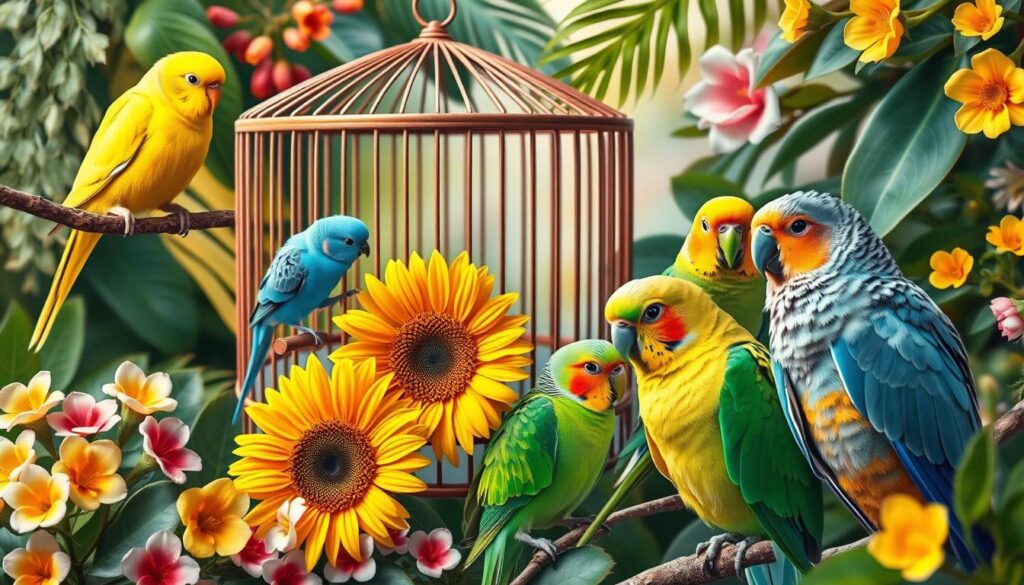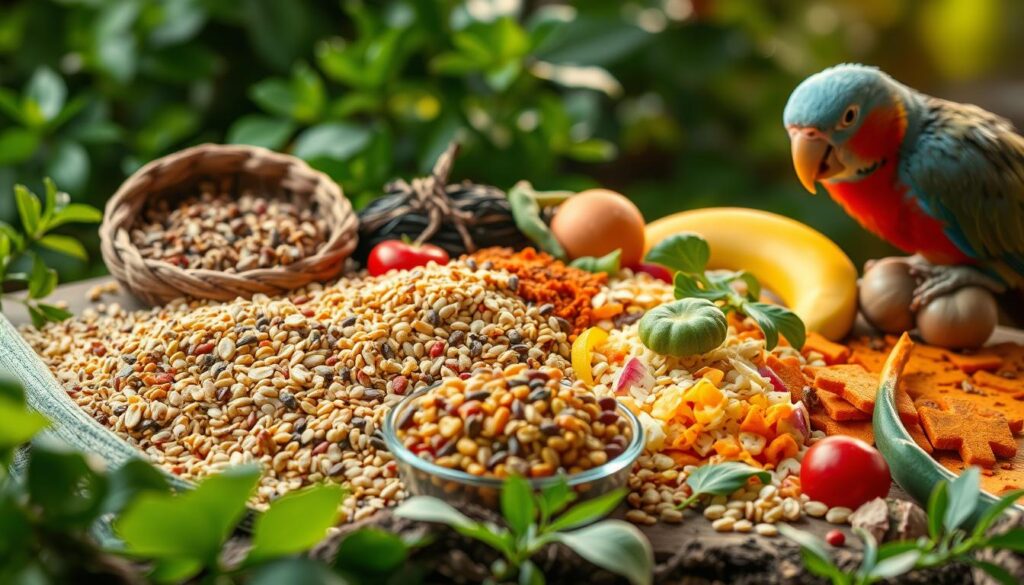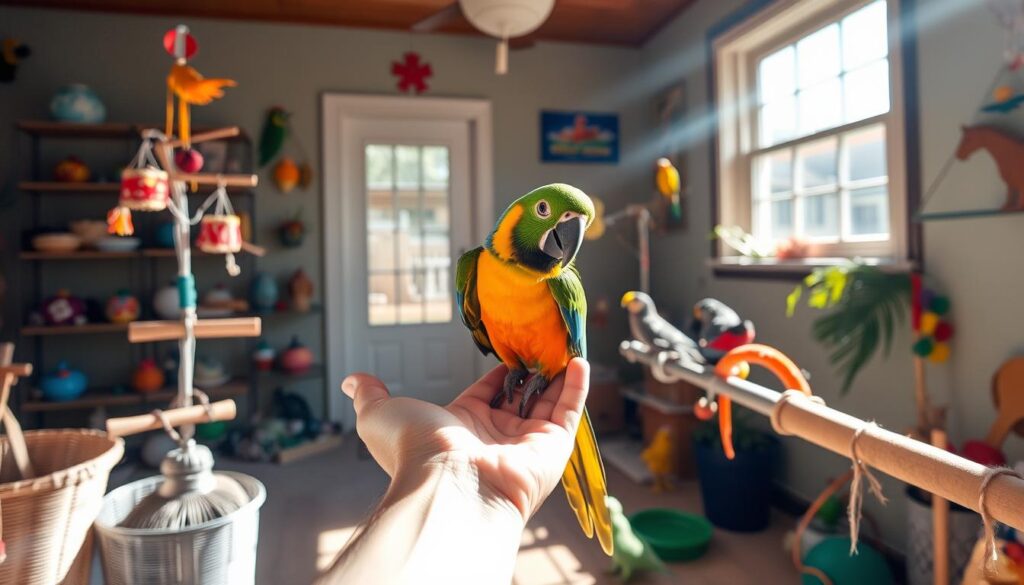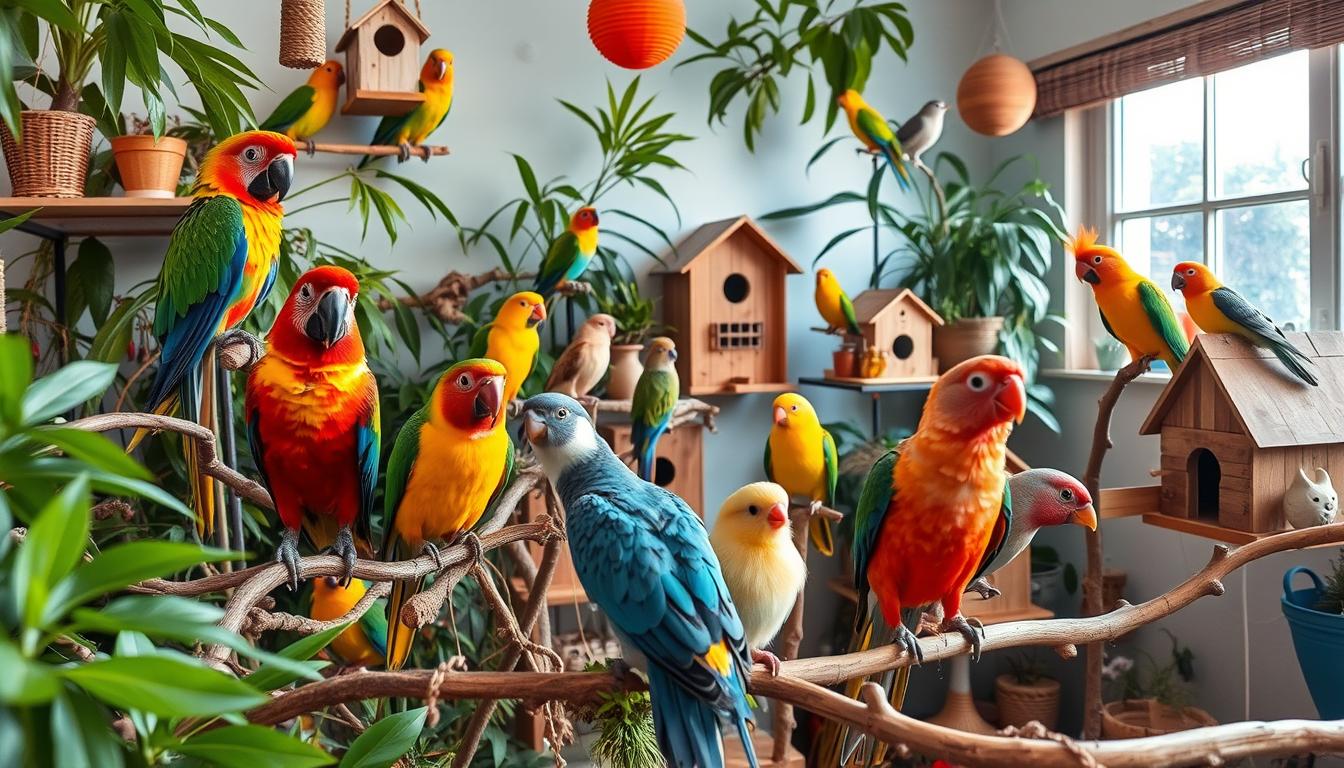Pet birds are amazing creatures that add joy and friendship to our lives. They come in many types, making them a favorite pet choice. It’s important to care for them well to keep them healthy and happy.
In the United States, many people love having pet birds. They offer many benefits, like social interaction and stress relief. Knowing what each bird species needs helps us care for them better. From budgies to cockatiels, each has its own special traits and needs.
If you’re new to bird ownership or already have some, this guide is for you. It’s packed with tips on bird care, nutrition, and behavior. By exploring the world of pet birds, you’ll see the joy they bring and learn how to make their lives better.
Key Takeaways
- Pet birds offer companionship and social interaction
- Proper bird care is essential for the health and happiness of pet birds
- Understanding the different bird species and their needs is crucial for providing the best care
- Pet birds can provide stress relief and other benefits for their owners
- Creating a suitable environment is vital for the well-being of pet birds
- Bird care includes nutrition, behavior, and health aspects
Understanding the World of Pet Birds
Exploring the world of pet birds reveals many benefits and myths. Proper bird care is key to their happiness. With the right care, birds can be loving and loyal friends, enriching our lives.
Some people think all birds are loud or demanding. But, many bird species are quiet and gentle. Knowing bird behavior helps us understand and appreciate our feathered companions better.
Benefits of Bird Companionship
Having a pet bird brings many joys, like companionship and mental stimulation. Birds can form deep bonds with their owners. With the right care, they become cherished family members. Parakeets and cockatiels, for example, are known for their loving and playful nature.
Common Misconceptions About Bird Ownership
Despite the joys of bird ownership, some myths might scare off potential owners. One myth is that birds are easy pets. While birds need less space than dogs or cats, they still require regular care and interaction to be happy.
What to Expect as a Bird Owner
As a bird owner, you’ll need to create a stimulating environment. This includes toys, perches, and social time. You’ll also have to do regular bird care tasks, like cage cleaning and health checks. Understanding your bird’s needs helps create a happy home for them.
Important things to think about when owning a pet bird include:
- Providing a balanced diet that meets your bird’s nutritional needs
- Creating a stimulating environment that encourages exercise and play
- Committing to regular social interaction and training
- Monitoring your bird’s health and seeking veterinary care when necessary
Selecting Your Perfect Feathered Friend
Choosing a pet bird means looking at many bird species. Each has its own traits, needs, and personality. It’s key to pick a bird that matches your lifestyle and what you like. Think about size, how friendly they are, and if they need special care.
Some important things to consider are:
- Size: Big birds need more room and exercise. Small birds are better for smaller homes.
- Temperament: Some birds love to be around people a lot. Others are happy alone.
- Special needs: Some birds need special food or living conditions to stay healthy.
By knowing these things and researching bird species, you can choose the right bird for you. Good bird care is also important. Picking a bird that fits your life means you can give them the best care.
There are many places to learn about pet birds. Online forums and local bird clubs are great resources. Talking to bird owners can give you lots of helpful tips. By doing your homework, you can pick the perfect bird and take great care of them.
Popular Pet Birds for Beginners
Starting with a pet bird can be a big decision. Some birds are better for beginners because they are friendly, small, and easy to care for. There are many popular pet birds known for their unique personalities and needs.
It’s important to take good care of your bird. This means having the right cage, a balanced diet, and spending time with them. With the right care, many bird species can be happy pets, bringing joy to their owners.
Budgerigars and Cockatiels
Budgerigars and Cockatiels are great for beginners. They are gentle and love to be around people. They need regular interaction and a diet of seeds, fruits, and veggies.

Finches and Canaries
Finches and Canaries are easy pets. They need a well-ventilated cage with toys and perches. They are low-maintenance and can be a good choice for beginners.
Lovebirds and Conures
Lovebirds and Conures are playful and social. They need lots of interaction and a balanced diet. With the right care, they can be wonderful pets for beginners.
Essential Equipment for Bird Care
Creating the right environment is key for your bird’s health and happiness. Choosing the right bird care equipment is crucial. This includes bird cages that are big enough for your bird to fly, and perches and toys to keep them entertained.
A good bird cage should fit your bird’s wingspan and have room for perches, toys, and food. It should also be easy to clean and strong enough for your bird’s beak and claws. A balanced bird diet is also vital for your bird’s health.
Some must-have items for bird care are:
- Food and water dishes that are easy to clean and refill
- A variety of toys and perches to keep your bird stimulated and active
- A bird bath or shower to keep your bird clean and hygienic
- A cage cover or blanket to provide a sense of security and comfort
By getting the right equipment and a balanced bird diet, you can make a happy and healthy home for your bird. Always research and understand your bird’s specific needs to give them the best care.
| Equipment | Description |
|---|---|
| Bird Cages | Spacious and sturdy cages for your bird to fly around |
| Perches and Toys | Variety of perches and toys to keep your bird stimulated and active |
| Feeding and Water Stations | Easy-to-clean and refill food and water dishes |
Creating the Perfect Bird Environment
When it comes to bird care, the environment is key. It affects a bird’s well-being and bird behavior. A good environment can reduce stress and help your bird stay healthy.
To make a perfect bird environment, think about these things:
- Lighting: Mix natural and artificial light for a day-night cycle.
- Temperature: Keep it comfy, avoiding too hot or cold.
- Humidity: Make sure it’s not too dry or wet, for your bird’s health.
- Noise levels: Keep it quiet to avoid stress and anxiety.
Also, a stimulating environment is important for your bird’s mind and feelings. This means changing toys and giving them friends. A great environment helps your bird behave well and live a happy life.
Follow these tips to make a perfect home for your bird. This will support its health and bird care needs.
Nutrition and Dietary Requirements
A balanced bird diet is key for their health and long life. A well-planned diet gives birds the nutrients, vitamins, and minerals they need. It should include pellets, fruits, vegetables, and grains.
For bird health, a proper diet is vital. Without the right nutrients, birds can get sick and have a weak immune system. It’s important to give them a diet that meets their nutritional needs.
Basic Diet Components
The main parts of a bird’s diet are pellets, fruits, vegetables, and grains. Pellets should be the main food, with fruits and vegetables added. Grains like brown rice and quinoa can also be part of their diet.
Treats and Supplements
Treats and supplements should be given in small amounts. Fresh fruits and vegetables are great treats. Supplements like calcium and vitamin D help with strong bones.

Feeding Schedule Tips
It’s important to have a feeding schedule for your bird. Offer a variety of foods at each meal. Limit treats and supplements to 10% of their daily diet.
| Food Type | Recommended Amount |
|---|---|
| Pellets | 50-60% of daily diet |
| Fruits and Vegetables | 20-30% of daily diet |
| Grains | 10-20% of daily diet |
Daily Care Routines for Pet Birds
Creating a daily care routine is crucial for your pet bird’s health and happiness. A good routine makes sure your bird gets the care it needs to do well. This includes cleaning the cage, giving fresh food and water, and making sure they exercise and socialize.
Here are some important tasks for a daily care routine for pet birds:
- Cleaning the cage and accessories
- Providing a balanced and nutritious diet
- Ensuring access to fresh water
- Offering opportunities for exercise and play
- Spending quality time with your bird to promote social interaction and bonding
Being consistent is important for your bird’s daily care. A regular schedule helps your bird feel safe and builds trust. Always watch how your bird acts and change the routine if needed to keep them healthy and happy.
Understanding Bird Behavior and Body Language
Knowing bird behavior is key to caring for them and spotting health problems. Different behaviors like foraging, preening, and singing tell us a lot about a bird’s health. For example, a bird that’s foraging well might be in good health. But, a bird that’s preening too much might be stressed.
Stress in birds can show up in many ways, like changes in appetite or how they look. On the other hand, signs of joy include playing, singing, and being social. It’s important to notice these signs to care for your bird right. You can find more about bird behavior and these signs online.
Common Behavioral Patterns
- Foraging: searching for food
- Preening: grooming and maintaining feathers
- Vocalization: making sounds to communicate
Signs of Stress and Happiness
It’s crucial to know when your bird is stressed or happy. By understanding bird behavior and bird health, you can make your bird’s life better.
Training Techniques and Socialization
Effective bird training is key to a strong bond between bird and owner. It makes birds calm and well-behaved in different situations. Using positive reinforcement, like rewards, is a good way to train birds. It’s also important to understand bird behavior to meet their needs.
Some important parts of bird training are:
- Creating a routine and setting clear rules
- Using positive reinforcement, like rewards and praise
- Keeping birds mentally and physically active through play and exercise
Socialization is also vital for bird behavior and training. It means introducing birds to new people, places, and things. This helps them feel confident and calm in many situations. With good training and socialization, birds can become well-behaved and close to their owners.
By following these tips, owners can make their birds happy, social, and well-behaved. Always use positive reinforcement and gentle training. Be patient and consistent in your approach.
Healthcare and Wellness Essentials
Keeping your bird healthy is key to their well-being. A well-cared-for bird is less likely to get sick. Regular vet visits can catch problems early.
Preventive Care Measures
Preventive care, like vaccinations and parasite control, protects your bird. A balanced diet and a clean home are also vital for their health.
Common Health Issues
Birds can face issues like respiratory infections, feather plucking, and behavioral problems. Knowing these and getting vet help if needed is crucial.
Here are some common health issues to watch out for:
- Respiratory infections
- Feather plucking
- Behavioral problems
When to Visit an Avian Vet
If your bird shows signs of illness, see an avian vet fast. Early treatment can greatly improve their chances.
By following these tips, your bird can live a long, happy life. Regular vet visits and proactive care are essential for their health.
Enrichment Activities and Mental Stimulation
Good bird care means giving your bird mental challenges. Birds are smart and need things to do to stay happy and healthy. Puzzle toys and foraging games are great ways to keep them busy.
It’s important to change things up often. Try new toys, rearrange the cage, or take your bird outside. Knowing your bird’s likes helps you pick the best activities for them.
Here are some ideas for fun activities:
- Puzzle toys filled with treats
- Foraging activities, such as hiding food or treats
- Outdoor excursions under close supervision
- Introducing new toys or changing the cage layout
Building Trust with Your Bird
Creating a strong bond with your pet bird is key for a happy and healthy relationship. Understanding bird behavior helps you meet your bird’s unique needs. Gentle interaction, like offering treats and doing activities together, is a great way to build trust.

To teach your bird good habits, use bird training techniques. Focus on positive reinforcement, like rewards and praise for good behavior. A daily routine with interaction and exercise makes your bird feel secure and builds trust in you.
Bonding Exercises
- Offering treats, such as sunflower seeds or fresh fruits
- Engaging in play, such as swinging toys or playing with bells
- Providing a variety of perches and swings to keep your bird active
Positive Reinforcement Methods
Positive reinforcement helps your bird learn good behaviors, like stepping on a perch or doing tricks. This method strengthens your bond and helps you understand bird behavior better. It also makes bird training more effective.
Safety Considerations for Bird Owners
Ensuring the safety of both the bird and the owner is key in bird care. This means keeping the bird away from harmful things like toxic substances and electrical cords. It also means protecting the owner from risks like bird bites and scratches. For more info on bird health and safety, learning about your bird’s specific needs is important.
To make a safe space for your bird, consider these tips:
- Remove any toxic substances or materials from the bird’s reach
- Secure electrical cords and wires to prevent accidental ingestion or entanglement
- Keep other pets away from the bird to prevent stress and potential attacks
By following these safety tips and providing proper bird care, you can ensure your bird’s well-being. Always put your bird’s safety first and take steps to avoid accidents.
To keep your bird happy and healthy, offer a balanced diet and a clean, spacious cage. Regular social interaction is also key. By focusing on your bird’s bird care and bird health, you can build a strong bond and ensure a long, happy life for your feathered friend.
Embracing the Joy of Bird Companionship
Starting your journey with a pet bird is exciting. These creatures bring joy and wonder into your life. The bond you create with your bird is special and rewarding, filled with laughter and learning.
Every bird is unique, whether it’s a budgie’s dance, a canary’s song, or a cockatiel’s play. By caring for your bird, you create a lifelong friend. This friend will bring joy and a new appreciation for nature.
FAQ
What are the benefits of having a pet bird?
Birds offer companionship and mental stimulation. They also provide emotional support. They can teach children and adults new things. Plus, caring for birds can be a fun hobby.
What are some common misconceptions about owning a pet bird?
Many think all birds are loud and hard to train. But, many species are quiet and easy to teach. With the right care, they can be low maintenance.
What should I expect as a first-time bird owner?
First-time owners need to commit time to care for their birds. This includes cleaning cages, feeding, and playing with them. Birds need a special diet and the right home to be happy.
What are some popular pet bird species for beginners?
Beginners often choose budgerigars, cockatiels, finches, canaries, lovebirds, and conures. These birds are friendly, small, and easy to care for.
What type of cage and equipment do I need for a pet bird?
You’ll need the right cage size, perches, toys, and feeding stations. A good cage, varied perches, and fun toys make a happy bird environment.
How do I create the perfect environment for my pet bird?
Make sure your bird’s space has the right light, temperature, humidity, and noise. Rotate toys and interact with your bird to keep them happy.
What are the essential components of a bird’s diet?
A bird’s diet should include pellets, fresh fruits and veggies, grains, and treats. Sometimes, extra supplements are needed to meet their nutritional needs.
What are some common behavioral patterns in birds?
Birds forage, preen, vocalize, and socialize. Knowing these behaviors helps you understand if your bird is stressed or happy.
How can I train and socialize my pet bird?
Use positive reinforcement and socialization to bond with your bird. Introduce them to new people, places, and birds to keep them confident and well-adjusted.
What are the essential healthcare and wellness considerations for pet birds?
Regular vet visits, vaccinations, and parasite control are key to your bird’s health. Knowing about common health issues and when to see a vet is important for your bird’s well-being.

